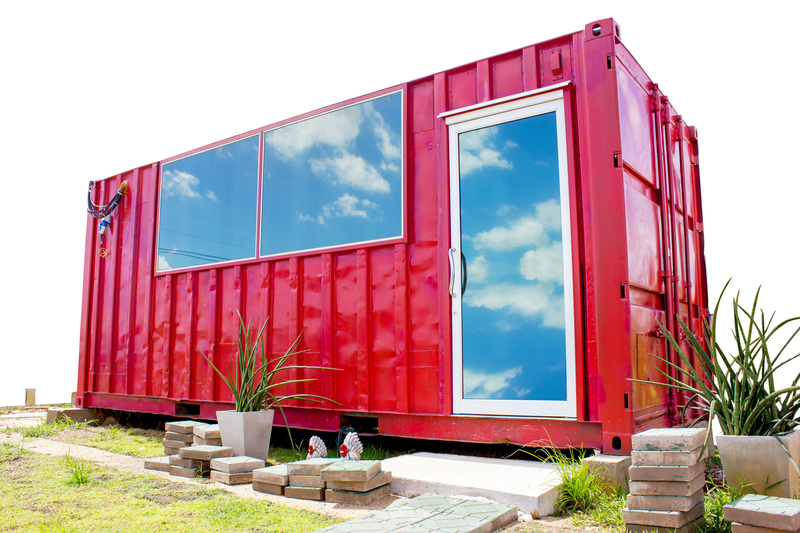Office Waste Management: Green Solutions for Today's Offices
Efficient office waste management plays a crucial role in building sustainable, environmentally responsible workplaces. As businesses strive towards eco-friendly practices, implementing effective waste management systems becomes a top priority for reducing their carbon footprint, optimizing resources, and enhancing brand reputation. This comprehensive guide explores modern green solutions for office waste and provides practical steps for transforming your workspace into a sustainability champion.
Why Is Office Waste Management Important?
Offices, big or small, are significant contributors to urban waste streams. From paper and cardboard to electronics and food scraps, the typical office environment generates a variety of waste items that, if not managed properly, can end up in landfills and exacerbate environmental degradation.
- Environmental Impact: Poor waste management leads to increased pollution, greenhouse gas emissions, and resource wastage.
- Corporate Responsibility: Adopting green waste solutions enhances a company's reputation among clients, investors, and employees.
- Cost Savings: Reducing, reusing, and recycling can help businesses cut expenses associated with disposal and purchasing of office supplies.
- Legal Compliance: Many regions have regulations regarding waste handling, especially for hazardous or electronic waste.

Types of Office Waste
Understanding what types of waste your office produces is the first step in designing an efficient waste management system. Most office waste falls under these categories:
- Paper waste: Memos, reports, printouts, packaging, and junk mail.
- Cardboard packaging and shipping containers.
- Plastic waste: Bottles, wrappers, bags, and packaging.
- Electronic waste (e-waste): Old computers, printers, batteries, and mobile devices.
- Food waste: From staff kitchens, cafeterias, or catering services.
- General waste: Items that cannot be recycled or composted.
Green Solutions for Office Waste Management
In the journey towards a sustainable office environment, businesses today have access to a range of green waste management solutions. These practices help in reducing landfill waste, saving resources, and fostering a culture of environmental responsibility among employees. Let's explore the most impactful tactics.
1. Reduce: Minimizing Waste at the Source
- Go Digital: Encourage digital documentation to limit paper use. Cloud storage, e-signatures, and digital communication should be standard office practices.
- Print Wisely: Set printers to double-sided (duplex) mode and use print preview to avoid unnecessary pages.
- Opt for Reusables: Replace single-use cups, plates, and cutlery with reusable alternatives in office kitchens and cafeterias.
- Order Smartly: Buy supplies in bulk to reduce packaging waste and prefer products with minimal packaging or eco-friendly materials.
2. Reuse: Extending Product Lifespan
- Stationery Swap: Set up a station for sharing and reusing pens, binders, folders, and other common items.
- Furniture Donation: Donate old desks, chairs, and electronics to local charities or offer them to employees for personal use.
- Repurpose Materials: Use old envelopes and boxes for internal mail or storage instead of discarding them.
3. Recycle: Closing the Loop
- Recycling Stations: Place easily accessible, clearly marked recycling bins for paper, plastics, metals, and glass throughout the office.
- Electronic Waste Collection: Partner with certified e-waste recyclers to properly dispose of out-of-use devices.
- Batteries and Ink Cartridges: Implement take-back programs or return options for recycling hazardous items safely.
4. Composting: Tackling Food and Organic Waste
- Kitchen Compost Bins: Provide collection bins for coffee grounds, fruit peels, and other food scraps in common areas.
- Community Composting: If space allows, start an on-site composting initiative or team up with local composting facilities.
- Education: Inform employees about what can and cannot be composted to minimize contamination.
5. Sustainable Procurement
- Eco-friendly Office Supplies: Choose recycled paper, biodegradable products, and items with minimal environmental footprint.
- Green Vendors: Partner with suppliers who prioritize sustainability in production and packaging.
- Sustainable Electronics: Opt for energy-efficient electronics with EPEAT or Energy Star ratings.
Creating an Effective Office Waste Management Plan
Developing a robust office recycling and waste reduction strategy involves more than just placing a few bins around. It requires planning, buy-in from stakeholders, and continuous improvement. Here's how you can design and implement a winning plan:
Step 1: Audit Your Waste
- Conduct a Waste Audit: Track the types, sources, and quantities of waste your office produces over a typical week.
- Identify Problem Areas: Determine which departments or processes generate the most waste and identify potential improvements.
Step 2: Set Clear Waste Management Goals
- Reduce overall waste by a specific percentage over the next year.
- Increase recycling rates and decrease landfill contributions.
- Achieve zero-waste office certification or a comparable eco-standard.
Step 3: Engage and Educate Employees
- Awareness Campaigns: Share facts, tips, and reminders about office recycling and reducing waste through posters, emails, or workshops.
- Incentive Programs: Recognize and reward teams or individuals leading sustainability efforts.
- Clear Signage: Use color-coded bins and simple infographics to show what goes where, minimizing confusion and contamination.
Step 4: Partner with Responsible Waste Contractors
- Certified Recyclers: Work with local waste management companies that practice responsible sorting, recycling, and disposal.
- Regular Collection: Schedule appropriate pickup times for recyclables, e-waste, and compostables separately from general waste.
Step 5: Monitor, Measure, and Improve
- Record Data: Keep track of how much waste is diverted from landfill each month, and look for trends over time.
- Review Processes: Regularly assess and update your office waste management strategy to address new challenges and opportunities.
- Seek Feedback: Encourage employees to share ideas and concerns regarding waste handling.
Innovative Technologies in Green Office Waste Management
Advancements in technology are revolutionizing how offices handle waste. From smart sensors to digital waste tracking, here are some cutting-edge solutions:
- Smart Bins: Bins equipped with fill-level sensors alert staff when they need emptying, optimizing collection schedules and reducing labor.
- Waste Sorting AI: Some offices deploy artificial intelligence to identify and sort recyclables from general waste, minimizing contamination and increasing recycling efficiency.
- Recycling Apps: Smartphone apps can help employees locate recycling stations, learn proper sorting rules, and even participate in green challenges for rewards.
- Composting Machines: Compact office composters process food and organic waste quickly, producing compost for on-site landscaping or donation.
Office Waste Management: Best Practices and Tips
- Promote Paperless Meetings: Share presentations and agendas digitally instead of printing copies for each attendee.
- Standardize Office Supplies: Use refillable pens and markers, and limit purchasing to essential, durable items.
- Educate Regularly: Host annual or quarterly workshops on environmental awareness and responsible waste management.
- Encourage Green Commuting: Set up a bike rack, sponsor public transit passes, or organize carpool programs to lower overall emissions from staff travel.
- Measure Impact: Publish sustainability reports to highlight waste reduction achievements and encourage continuous progress.
Benefits of Sustainable Office Waste Management
Adopting a comprehensive office waste reduction strategy delivers wide-ranging advantages for businesses, employees, and the environment:
- Environmental Conservation: Reduces deforestation, water pollution, and carbon emissions associated with raw material extraction and landfill operations.
- Operational Efficiency: Streamlined procurement and reduced wastage lead to long-term cost savings.
- Improved Employee Engagement: Green offices foster pride and a sense of purpose among staff, enhancing morale and retention.
- Positive Brand Image: Sustainability is a key differentiator in today's market, attracting eco-conscious clients and talent.
- Regulatory Compliance: Proactive waste management stays ahead of evolving environmental regulations, minimizing legal risks and fines.
Common Challenges in Office Waste Management and How to Overcome Them
Implementing effective office recycling and waste solutions is not without challenges. Here's how to tackle the most common obstacles:
- Lack of Participation: Combat apathy by providing education, motivation, and easy-to-follow systems. Make waste sorting as simple as possible.
- Contamination of Recycling Streams: Use clear bin labeling and regular training to reduce mistakes like throwing food waste in paper bins.
- Limited Space: Choose compact bins and consider shared recycling stations for small offices. Vertical stacking can further optimize space use.
- Changing Habits: Lead by example and implement 'green champions' programs to cultivate sustainability-minded leaders.
- Budget Constraints: Focus on low-cost, high-impact solutions first, and look for government grants or partnership opportunities.

Case Studies: Successful Office Waste Management Programs
Case Study 1: Tech Company Achieves Zero-Waste Certification
A leading software firm launched an ambitious zero-waste office program involving employee workshops, dedicated recycling and compost stations, and a strict sustainable procurement policy. Within two years, they achieved over 95% landfill diversion rate, earning recognition as one of the greenest offices in their city.
Case Study 2: Law Firm Cuts Paper Waste by 70%
A mid-sized law firm transitioned to electronic billing, e-signatures, and digital files, eliminating nearly three-quarters of their paper waste. Monthly updates and print quotas kept employees accountable, resulting in over $10,000 saved annually on supplies and printing costs.
Conclusion: The Future of Green Office Waste Management
Modern businesses cannot afford to overlook the importance of office waste management. By embracing green solutions for office waste, companies not only protect the environment but also build more resilient, cost-effective, and positive workplaces. Whether you're starting small with a recycling initiative or aiming for a zero-waste certification, every action counts.
A greener office is within reach for any organization willing to plan thoughtfully, educate employees, and prioritize sustainability. Let's work together to create an office culture where waste is minimized, resources are valued, and the planet is preserved for future generations.
Ready to improve your office's waste management? Start today--your business, your people, and your planet will thank you.